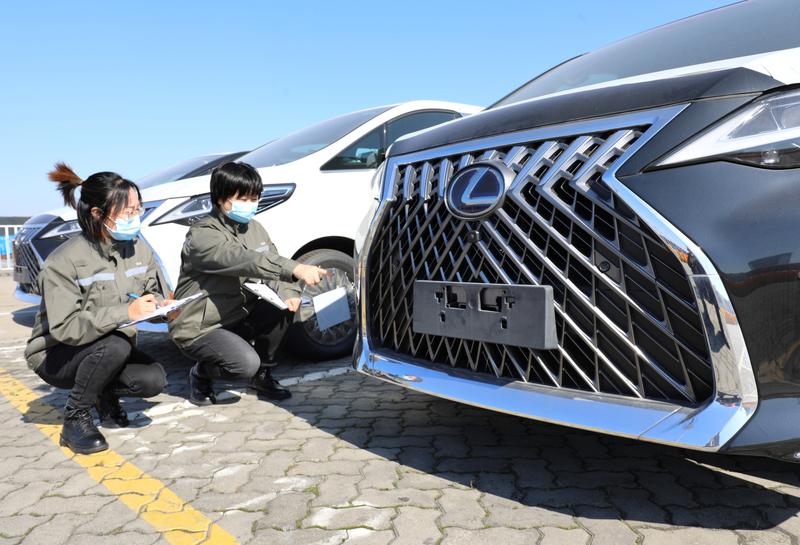 Employees of Zhangjiagang Free Trade Science & Technology Co Ltd in Jiangsu province register cars imported from Japan. (SHI BAIRONG / FOR CHINA DAILY)
Employees of Zhangjiagang Free Trade Science & Technology Co Ltd in Jiangsu province register cars imported from Japan. (SHI BAIRONG / FOR CHINA DAILY)
Economic and trade cooperation between China and Japan is set to grow on the back of the Regional Comprehensive Economic Partnership agreement, which took effect in 10 of its 15 member economies on Saturday, experts said on Monday.
This, they said, will further strengthen regional economic expansion despite COVID-19.
China and Japan, which are the world's second- and third-largest economies, respectively, have forged bilateral free trade relations for the first time, following the RCEP, experts said.
They further said the breakthrough will help with the negotiations on the China-Japan-South Korea Free Trade Agreement.
Signed by 15 Asia-Pacific economies in November 2020, the RCEP agreement took effect on Saturday in 10 member economies, including Singapore, Thailand, China and Japan. They will be followed by South Korea on Feb 1.
The RCEP agreement will come into effect in the rest of the member economies 60 days after they finish verification procedures.
Around 25 percent of Japanese exports to China and 57 percent of Chinese exports to Japan have become tariff-free since Saturday. The two figures will eventually rise to 86 percent and 88 percent, respectively.
"China and Japan have already enjoyed strong economic and trade relations, thanks to their complementarity in trade, and the prospects are even brighter with the implementation of the RCEP agreement," said Bai Ming, deputy director of international market research at the Chinese Academy of International Trade and Economic Cooperation.
"Potentials from the geographic proximity of the two nations will be fully unleashed to tighten economic ties and benefit enterprises and people."
During the first half of 2021, the value of China-Japan trade surged by about 24 percent year-on-year to surpass $181 billion. China exported more than $80 billion worth of goods to Japan during the period, up nearly 19 percent. Its imports from Japan grew by nearly 28 percent to around $101 billion, according to China's Ministry of Commerce.
Significant tariff reduction and elimination have been scheduled in most of the two nations' major trading sectors.
That will result in a win-win situation, said Zhang Jifeng, vice-chairman of the Chinese Association for Japanese Economic Studies.
More products traded between China and Japan will become eligible for zero tariffs over time. Combined with the RCEP's accumulative rules of origin, which allow a product to enjoy tariff reduction or abolishment as long as it adds at least 40 percent of its value within the RCEP region, trade between the two nations is expected to expand, Zhang said in a note.
Producers of major Chinese export items to Japan like machinery, electronic equipment, textiles and clothing products will benefit from lower or zero tariffs.
Japanese producers of electrical and electronic products, machinery, automobile components and some agricultural and food products like sake will also enjoy significant tariff concessions when they export their products to China.
Hengyang, Hunan province-based Deyang Shoes Co Ltd said its annual exports are worth $8.1 million, and thanks to the RCEP, it could save $920,000 on tariffs each year. Deyang Shoes imports raw materials from South Korea, Vietnam, Thailand and Indonesia to produce and export finished shoe products to Japan, South Korea and some other countries.
Zhang predicted trade in services and investment cooperation between China and Japan will also expand rapidly, thanks to the expanded market entry.


